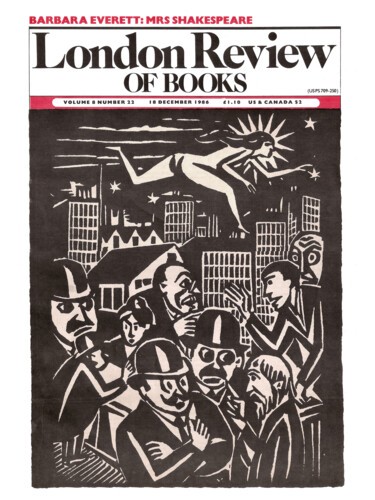In a Trailways, shaking over red clay,
wild poor shapes hang in a sulky wind
of glazed polythene. As we start,
a child bellows softly, she mews at
her mother’s breasts pressed up into the v
of an ill-made blouse. The gaze is cheerful,
her repose her daughter’s sleep, father
unfolding in it like the soiled shapes
of duster he cannot sell.
The planted rows, the dead all men,
their adversary stain bruised
like mulberry on red clay. A barn
of warped, bare wood pinned in it,
nailed to the shape weather splays. Pines,
their branches held down to gain height
for the bole. The poor lift their arms
and sniff the armpit’s sour
compelling familiar. The bus shudders
as clutch and drive engage. ‘What’s here for me,
the wisp, the grin scratched in a dull pane?’
With a friend, long-tailed males,
gobbling Arab food baked in the fanged
bevelled taste of pine-nuts – taste
of trees in mist – I watched two women
enter the restaurant, the shorter lifting
in the s shape contour of her dress
her silked thighs, like a hind, light
deliberate steps, yet steps full
as the body of a hind as it steps.
‘Gentlemen, please,’ our guide pleaded.
The engine cuts. Over tarmac
diesel has messed, the journey
unwinds its head like a ball, a twine on which
dead soldiers dawdle
like beads. The lovely energies subdue.
In one hand
the sopping brain
and dead grin, a weed in the other,
its bud in milky blue triangles.
The serpent, none to pick its fruits, creeps
under the bush, to lie up stiff and straight
like a new stick stripped of its bark, coloured
as brilliant as spiced, poor food.
‘Hower yawl? I’m white trash (it mimics)
better’n the black.’ We grin,
stung like asps, to hear our thoughts
made plain and English. ‘How-er yawl?’
Dead and wrong. Those souvenirs, bayonet
and webbing, greed for our fingers. The serpent
shuffles in the bush, the skin, bound to its jaws
in filled triangles of quick shapes,
gets stained in blood.
The sepia plates of slaves, the bidding fixed
in their expressions, the flesh exemplary
in servitude. On another plate, mildews
touch the hanging lamp of a rail-junction,
the criss-crossing of rival companies
tracking the prairie, winding the lush anchorages
of lilac brandishing its mourning shapes;
the lamp that grows, the only lamp that grows
solicitude. Like threads a spider runs
across a field, the tracks combine and draw
men keeping farm, or the ashy furnace –
its pour of iron, its granular heat.
Abundant whitenesses of cotton and steam,
their shushed energies serving a head
canted in one direction. They gather
to feed the gatling, poised, bored
on its tripod, ready for the hands to grip,
the face behind it
pieced together, like the seams and cooling-chambers
that make the thing a possibility,
a well-made thing, cunning
as a horse. Like candles, carefully,
firmly strapped to form a barrel:
the grin on triangles, firing blood.
The train has lost the junction, the wagons of men
up-ended in battle, the torn mixtures
of many bodies
hanging from spars, flung against iron castings.
And all the time more pulsing engines sweat;
their heavy boilers, their couplings; the flanged sun.
‘How c’n I see yer that ain’t he-ah
We paid reparation until we’re white,
to nineteen forty-seven. Now we’re fergiven
what yer can’t be fergiven of.
For losin a war, like a clip
of a bullet. Ma dear child, the farm
lays in the grass, poverty lays in the grass.’
Send Letters To:
The Editor
London Review of Books,
28 Little Russell Street
London, WC1A 2HN
letters@lrb.co.uk
Please include name, address, and a telephone number.

